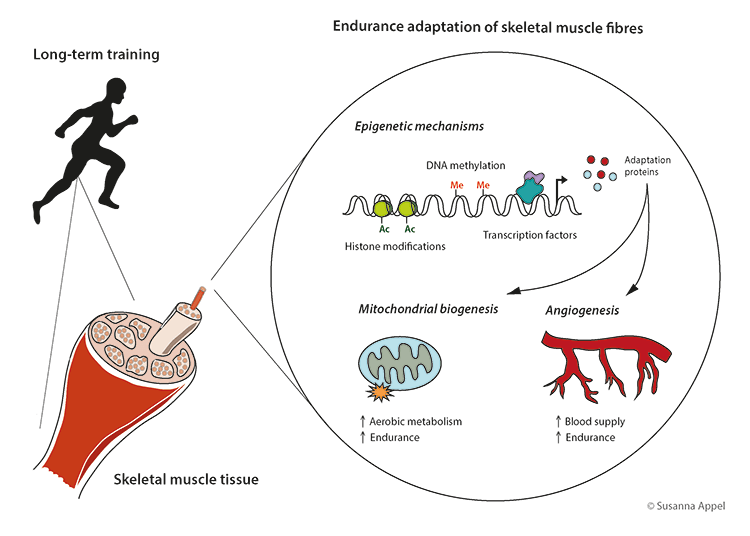Projects
For a more general description of our research please see this page in Swedish (click on "Denna sida på svenska").
Regular physical activity provides health benefits for men and women of all ages, ranging from reduced risks of cardiovascular diseases, diabetes and certain types of cancer, to enhanced skeletal muscle capacity. These benefits can all be ascribed to the adaptations that gradually occur with repeated exercise.
Physical training affects a multitude of tissues throughout the human body. For instance, the heart acquires the ability to beat larger and more effective strokes and the amount of body fat decreases. Our research mainly focuses on the exercise-induced mechanisms that take place in skeletal muscle tissue, both after a single exercise bout as well as following a period of training.
Mitochondrial biogenesis
One prominent adaptation resulting from endurance training is an increased density of mitochondria in the skeletal muscle fibres. More mitochondria improves metabolism with a higher capacity to produce useful energy in the form of ATP molecules, along with a shift towards greater fat utilization.
To characterize the molecular events that lead to mitochondrial biogenesis, we investigate the complex network of activators and inhibitors that, by regulating the expression of genes important for mitochondrial function or assembly, control the amount of mitochondria in skeletal muscle. In addition, we examine the occurrence of isoform variants of some of these regulating factors, and possible differences in their responses to exercise.
Epigenetic patterns
Our second area of research concerns epigenetic patterns, such as DNA methylation and histone modifications, in relation to exercise. The epigenetic state of a cell can influence the expression of its genome - regionally or specifically.
We explore how endurance training influences the epigenetic configuration in skeletal muscle tissue and if the epigenetic pattern itself can affect the training response. One hypothesis is that individuals with certain epigenetic patterns (characterized before commencing the training regimen) will be high-responders while those with different ones will be low-responders to training.
Methodology
To address our research questions, samples from human skeletal muscle biopsies and primary skeletal muscle cell cultures are subjected to an array of analyses, including qPCR, RNA sequencing, Western blotting, co-immunoprecipitation, chromatin immunoprecipitation, bisulfite pyrosequencing, enzymatic assays and global methylation analyses.

Research impact
Our research can provide a better understanding of the health-beneficial adaptations that occur with physical training - at the molecular level. This may lead to the development of new treatment strategies, e.g. for type-II-diabetics or patients that are incapable of physical activity due to paralysis or joint diseases. Furthermore, knowledge derived from our research can be of value for athletes on all levels when optimizing training programs for maximal performance.
Support our research
 Photo: Creative Commons CC0
Photo: Creative Commons CC0Make a donation to our research
Your support means a lot to the success of research. This allows us to go further in our efforts to improve human health through research and education.
